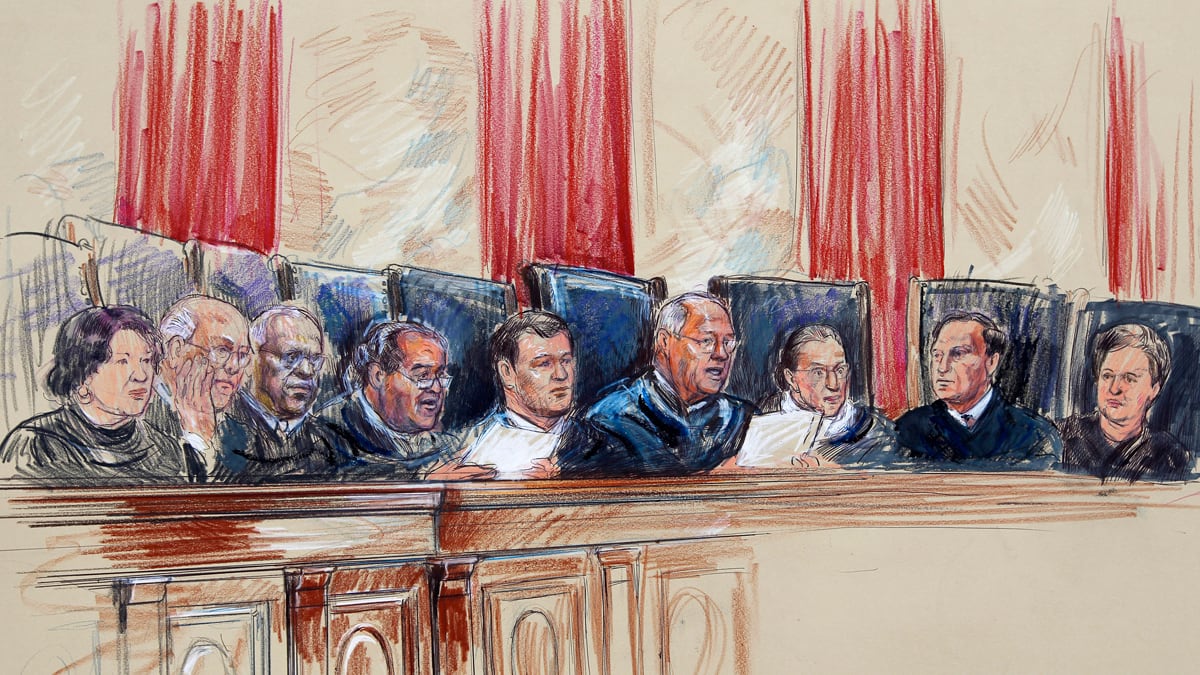Court watchers eager to find out how the Supreme Court would rule on President Obama’s health-care law were disappointed when the decision was not announced this morning. Yet the court did release its decision in another high-profile case, dealing with Arizona’s controversial immigration law, SB 1070. This case is significant for at least two reasons. First, it slams the breaks on the anti-immigration laws sweeping the states. Second, it offers tantalizing clues about how the court may rule on the health-care case.
The importance of the Arizona decision for our “nation of immigrants” is difficult to overstate. Lawmakers have pushed through a remarkable number of harsh laws designed to make life miserable for undocumented aliens. One study found that legislatures passed 164 anti-immigrant measures since 2010. Alabama, Georgia, Indiana, South Carolina, and Utah each enacted laws modeled after Arizona’s. Cities like Hazelton, Pa., have even barred undocumented aliens from renting an apartment.
Many of these laws were pushed by anti-immigration groups who expected a friendly embrace by the Roberts Court. What they found instead was that a solid majority of the court—the decision was 5–3, with Justice Elena Kagan recused—believes that only the federal government is authorized to make life miserable for undocumented aliens.
Nevertheless, the battle over Arizona’s immigration law is not finished. The court declined to rule on the constitutionality of the most controversial provision in SB 1070, which authorizes the police to verify the immigration status of people stopped for other law-enforcement purposes. So if you are stopped for jaywalking or driving with a broken headlight, the police can ask to see your papers. (That is, you’ll be asked to show your papers if you are Latino. Somehow, I don’t imagine the police are going to be checking the papers of the blond white guys.)
Although some early news reports said that the court upheld this “show me your papers” provision, that wasn’t quite right. The court determined that it didn’t have enough information about how the law worked in practice, especially considering the law explicitly commands the police not to engage in racial profiling. So the justices sent the dispute over this provision back to the lower courts for further fact finding. Nevertheless, the court specifically noted that if this law led to racial profiling, as I suspect it will be concluded, the law would be invalidated.

The Arizona case also might tell us a few things about the health-care ruling expected later this week. Perhaps the most important lesson is not to pay too much attention to oral argument.
Before the Supreme Court held its hearing on the immigration law, many constitutional law experts thought the case was a slam-dunk for the federal government, which was seeking to overturn the law. Traditionally, the courts have rejected state efforts to crack down on undocumented immigrants because the Constitution vests power over immigration and naturalization in Congress.
After oral argument in the Arizona case, however, it looked like the federal government was certain to lose. The conservative justices were openly hostile and even the moderates appeared unpersuaded by the Obama administration’s position. Justice Sonia Sotomayor, the first Latina justice and an Obama appointee, frankly told Obama’s lawyer that his argument was “not selling very well. Why don’t you try to come up with something else?”
Yet, in the end, a majority of the court bought the federal government’s argument after all.
This lesson should buoy supporters of Obamacare. Oral argument on the health-care law went decidedly against the administration. The solicitor general, the government’s chief advocate before the court, stumbled right from the beginning and took a beating from the justices. Legal analyst Jeff Toobin declared the hearing “a train wreck for the Obama administration” on CNN. “This law looks like it’s going to be struck down,” Toobin opined. “I’m telling you, all of the predictions including mine that the justices would not have a problem with this law were wrong.”
Or maybe not. Toobin and others may have been overreacting. The justices themselves say that oral argument rarely changes their votes. A high-profile case, with exceptional and numerous briefs, is not the kind where oral arguments are likely to matter.
The Arizona decision also contains other possible clues to how the court might rule on health care. Both Chief Justice John Roberts and Justice Anthony Kennedy came down in favor of a broad reading of federal power under the Constitution. Obamacare supporters are relying on those two justices to endorse a view of Congress’s power over interstate commerce equally expansive as Congress’s power over immigration.
Conversely, Obamacare supporters who were counting on the vote of Justice Antonin Scalia, who previously ruled that Congress’s commerce powers were large enough to warrant a federal ban on marijuana grown at home for personal use, can’t be thrilled. He dissented from the court’s Arizona ruling, in what should be read as an ode to state sovereignty and tightly constrained federal power.
Channeling the opponents of the Constitution of the 1780s, Scalia warned that if Arizona can’t control its border, then nothing is left of its sovereignty. Yet no state is sovereign over matters like immigration and naturalization, which the Constitution entrusts to Congress. It’s becoming increasingly clear that Scalia really is an originalist. He adheres to his own original and novel interpretation of the Constitution, unconstrained by history and steeped in Republican politics.
Of course, one shouldn’t make too much of the Arizona decisions. Reading these tea leaves could be just as hazardous as reading those from the oral argument.






